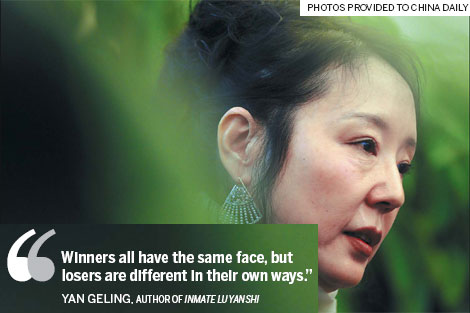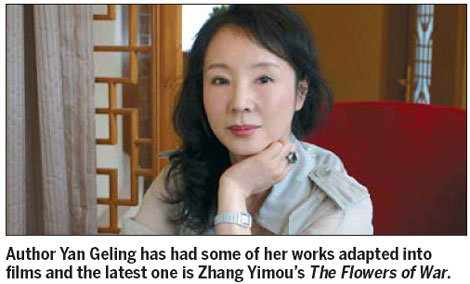In her grandfather's footsteps
Updated: 2011-12-16 07:35
By Yang Guang (China Daily)
|
|||||||||

Yan Geling's latest novel is based on her grandfather and was a work of self-discovery, she says. Yang Guang reports.
Chinese-American writer Yan Geling has written about various women with dramatic stories. Now, she has switched her subject matter to a man for Inmate Lu Yanshi. In her latest novel, Yan narrates the ups and downs of protagonist Lu Yanshi's life over half a century. Born in Shanghai with a silver spoon in his mouth, Lu is disappointed with his arranged marriage. He goes to the United States to study and returns to teach at universities. During the political campaigns of the early 1950s, he is condemned as an anti-revolutionary and sentenced to life imprisonment in the country's northwestern wilderness.
Lu gradually realizes how much he loves his wife during the years in prison. But when he is released after the "cultural revolution" (1966-1976), he finds it is impossible to integrate into his family once again.
| ||||
"The story has been in my mind for more than 20 years," Yan says. "Writing it was a process of self-discovery."
She says Lu is based on her grandfather, Yan Enchun, who is precocious and straightforward.
Yan's grandfather went overseas for graduate study at 20 and obtained his doctorate degree at 25. He was the first translator of Thomas Hardy's Tess of the D'Urbervilles. Disillusioned with the political and academic conditions at the time, he committed suicide at 40.
Yan says family members told her from an early age that she most resembles her grandfather, in terms of talent and temperament.
"It made me curious about my roots," she says.
Once a dancer, Yan still maintains a slender figure in her early 50s. Her strong will is easily detectable.
Born in Shanghai to a writer father and an actress mother, Yan was a good storyteller even as a child. Physically weak, she was not good at playing games, but she liked to read classical stories, such as The Lady of the Camellias and Cathedral of Notre Dame, to her young friends in the neighborhood.
"There were often times that I was not satisfied with the writers' characterizations, so I would improvise and tell the stories the way I liked," she recalls.
She joined the People's Liberation Army at 12, performing as a dancer in an art troupe. She volunteered to be a war correspondent during the Sino-Vietnamese border conflicts in the late 1970s, interviewing wounded soldiers at a field hospital in Yunnan province.
It was then that she began to write. Her first piece was published when she was 21. It was a short story about the arrival of a girl at a military station manned by seven young male soldiers in Tibet autonomous region. Most of her early works have a military flavor.
After a failed marriage, she went to the United States for graduate study in 1989 and obtained her Master of Fine Arts in fiction writing from Columbia College, Chicago. She married Lawrence Walker, an American diplomat, in 1992.
Yan describes her early days in the US as "traumatic", due to language and cultural barriers. "I felt like I was uprooted from the earth," she recalls. The insomnia she had suffered from since 23 worsened, and she once couldn't sleep for 34 days.
But sensitive nerves became the spring of her literary creation. She submitted stories to newspapers and magazines in Taiwan, which won her numerous prizes.
Yan is interested in fringe figures, such as robbers, prostitutes and illegal immigrants. "The marginalized follow fewer rules and are better material for a good story," she explains.
Her heroines and heroes are mostly losers in life, because "winners all have the same face, but losers are different in their own ways".
Several of her works have been adapted into films, including the award-winning Xiu Xiu: The Sent-Down Girl (directed by Joan Chen) and Siao Yu (directed by Sylvia Chang). Zhang Yimou's adaptation of her novella The Flowers of War is now being screened (see sidebar).
She has also written scripts based on her own and others' works, including Forever Enthralled, directed by Chen Kaige, a biographical film of Peking Opera artist Mei Lanfang.
But Yan says she still prefers writing novels. "The excitement of writing scripts can never compare with that of writing novels," she says.
Yan lives in Berlin, Germany, with her husband and daughter, a 7-year-old girl she adopted from an orphanage in Anhui province in 2004.














